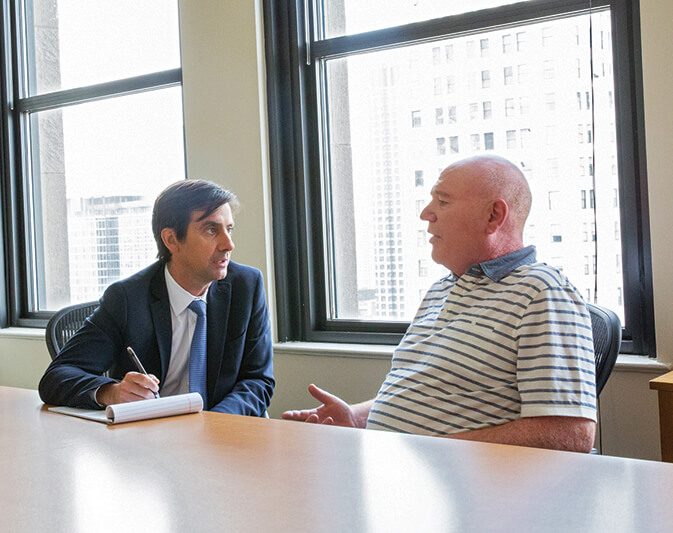

SSI benefits can provide you financial relief when you can’t work and have limited income and resources.
Do I Qualify for SSI in Chicago?
One of the first questions you’re likely to have for any SSI disability lawyer in Chicago is probably whether you have a strong case for benefits.
So, we’ll walk you through it. There are two sides to qualifying for SSI in Chicago:
- Your health limitations
- Your financial situation
When it comes to your health, you have to meet these requirements for SSI:
- You have severe health problems.
- It’s clear from your medical records and doctors’ opinions that your condition won’t improve enough for you to work for at least a year (if it hasn’t already been a year).
- Or you can show that your debilitating medical condition will last the rest of your life or eventually result in death.
You must also meet the financial requirements for SSI:
- You’re not earning much or anything from working.
- Your income from other programs, like workers’ compensation, unemployment, or veterans’ disability benefits, are limited and under the SSI maximum benefit amount.
- You’re not receiving much money from family or friends.
- You’re not receiving significant amounts of free food or shelter.
- You have little money in savings accounts.
- You have little in investment accounts.
- You have little land (other than your primary home).
- You have little other property (except one car that you need for transportation, and household or personal items).
The value of the resources you have that are counted for SSI is strictly limited for you to qualify for benefits:
- No more than $2,000 for an individual
- No more than $3,000 for a couple
You don’t have to guess whether you’ll qualify for SSI. It’s free to talk to our Supplemental Security Income lawyers at Nash Disability Law in Chicago for an evaluation of your case for benefits.
Our team of experienced lawyers and paralegals can also help determine what evidence is most important in proving your case. This may include medical records, doctor opinions, and financial statements. And we help you fill out forms mistake-free.
Get a free SSI disability case consultation from Nash.
What’s the Difference Between SSI and SSDI?
People often say “SSI” as short for disability benefits in general. But officially SSI is one of two disability programs run by Social Security.
The other one is called Social Security Disability Income (SSDI).
The medical requirements are the same for SSI and SSDI, but for SSDI you must have a qualifying recent work history of paying Social Security taxes to get benefits. In contrast, you don’t need a record of work experience for SSI.
Here’s how our Chicago disability attorneys break down the differences in SSI vs. SSDI:
SSDI: You must have worked and paid a qualifying amount in Social Security taxes recently to be covered.
SSI: You don’t need a work background or Social Security tax record.
SSDI: You’re not currently working more than what Social Security calls “substantial gainful activity” or SGA. (In 2026, that was $1,690 per month for non-blind people, $2,830 for people with blindness.)
SSI: You fall under the same SGA limit as SSDI.
SSDI: The monthly checks you receive under SSDI are based on your past income from working and can vary widely but might be more than SSI. (The average SSDI payment in 2026 was $1,630 per month).
SSI: Monthly checks from SSI are limited for everyone by a single number from the government, but can be reduced further to offset other sources of money you have, like other kinds of benefits. (In 2026, the maximum SSI payment was $994 for an individual and $1,491 for a couple.)
SSDI: With SSDI benefits, you can also qualify for Medicare health coverage even before you’re the usual age for Medicare, but after a waiting period from when you’re first eligible for disability benefits.
SSI: When you’re approved for SSI, you can continue your health coverage through Medicaid, but you will not qualify for early Medicare.
Sometimes, it can be hard to know whether to apply for SSI, SSDI or both. (It is possible to apply for both.)
For example, if you worked and could qualify for SSDI because of your work background, but your income was low enough that your monthly SSDI payment would turn out lower than SSI’s maximum benefit amount in your state, you may receive SSI.
You may receive SSDI if you have a qualifying work record and then you receive money from a source other than working, such as an inheritance or insurance settlement, which puts you over the limit of resources you can have in the bank for SSI.
It gets confusing. An experienced SSI disability lawyer helps you find the clearest path to the best option for you.
Call Nash Now!
Another Important Form of SSI: Childhood SSI
When you’re talking about SSI, it’s important to note that another key form of SSI exists for children.
Nash’s Chicago SSI lawyers help families apply for childhood SSI all the time. Not all law firms help with childhood SSI cases, but we do.
Children’s SSI is for children with disabilities whose families meet the SSI financial requirements.
These benefits can be a great help to parents and caregivers, helping cover some of the expenses of a child with special needs, including therapy, equipment, learning programs and more.
Children aren’t expected to have worked, so the qualifications for childhood SSI don’t hinge on ability to work like adult disability benefits.
Instead, children’s SSI has these qualifications:
- The child is under 18, or they’re 18 and in high school.
- Their disability gives them “functional limitations” according to Social Security, meaning they’re not able to do the same things or learn at the same level as other children their age.
- The medical record is clear that their limitations have already lasted a year or that they certainly will.
Like with all disability benefits, you have to prove your child qualifies for childhood SSI using information, evidence and arguments.
If you have a child with disabilities, and your household finances are strained, talk to Nash Disability Law about getting SSI for children.
What if They Denied Your SSI? Work with an SSI Appeal Lawyer in Chicago.
Like we said, most first-time applications for Supplemental Security Income are denied.
Social Security is always trying to stop people who don’t qualify from getting benefits, so they created thousands of rules to put your claim through.
They’ll likely deny you, which then requires you to appeal and submit more evidence and arguments to back up your SSI claim.
Getting denied for SSI can feel like a deeply disappointing rejection, but it’s a normal part of the process. You often get a better chance of approval when you appeal the denial.
An SSI denial attorney in Chicago can handle this for you. And just like when you first applied for SSI benefits, you still pay no attorney fee until you win.
These are the steps your SSI appeal lawyer may take you through:
- Studying your denial letter to see what you need to change in your claim.
- Recommending other forms of medical treatment to support your claim.
- Adding medical records and other updates to your case.
- Asking Social Security to reconsider their decision.
- Asking for a hearing with a Social Security Disability judge.
- Helping you prepare to testify for the judge.
- Representing you in your hearing.
- If needed, asking Social Security’s Appeals Council to review the judge’s decision.
Appealing adds months and sometimes years to your case before you win benefits, but in many cases, you can receive backpay for the months you waited to be approved.
So refusing to give up and continuing your fight for benefits may be the best thing you can do.
The process is hard, but in the end the economic cushion you could get from SSI benefits could make your life easier for years to come.
Why Get Local SSI Disability Lawyers in Chicago and not a National Company?
When you’re trying to get SSI disability benefits, you can find large national companies who say they help. Why should you work with a local disability law firm like Nash?
Part of the answer is that the Chicago SSI lawyers and SSI appeal lawyers at Nash know the local offices and resources for getting disability benefits.
It makes a difference because Social Security offices and Social Security Disability judges operate a little differently in different places.
The Nash Chicago SSI attorneys work with the local Social Security officials around Chicagoland every day. A big out-of-town company may not have that local knowledge.
For example, our SSI attorneys regularly attend hearings for our clients with judges from local disability hearing offices in Chicago, Evanston, Oak Brook and Orland Park.
From the time you ask for a hearing to when you reach a judge in one of those offices, it can take seven months or longer according to Social Security numbers from 2025.
After hearings take place, the disability judges in the Chicago area offices approve benefits at different rates—from 47% to 58% of the time as of 2025.
We know what the disability judges look for. And with a representative like a lawyer, government numbers have shown your chances of winning benefits after a hearing can be three times better than people without help.
Results are vital. But there’s a deeper reason to get a local, Chicago SSI lawyer when you live in Chicago or the suburbs.
This is a highly personal and sensitive situation. A local lawyer is more likely to give you the time, attention and care you deserve in a process that can feel uncaring.
At Nash Disability Law…
- We tell Social Security your individual story.
- We help you coordinate with Chicago area health centers, clinics and providers to get medical evidence you need. Our disability attorneys live here and know those places, too.
- We cover details you may not think of—and that mass-volume disability companies might overlook—including creating a picture of what your everyday life and routine are like with your medical conditions.
- We follow up to make sure Social Security received all your forms and documents, so you don’t get lost in the system.
- A Nash SSI denial attorney in Chicago will meet with you by phone or in person ahead of your hearing to help you prepare and feel more comfortable on hearing day. Your representative from a big disability company might only meet you one-on-one on the day of your hearing if at all, and may not even be an attorney
To your Chicago SSI attorney from Nash, you’re a neighbor, not a number.
Contact us for help with your SSI claim anywhere across Chicagoland.
What People Say About Working with Nash Chicago SSI Attorneys?
Picking an SSI disability lawyer is a big decision with potentially big effects on your finances and future.
When you’re making a decision like this, you want to know what the experience was like for other people who worked with a disability lawyer in a situation like yours.
Nash Disability Law has hundreds of reviews on Google from past clients who gave a combined rating of 4.5 stars.
These are just a few of their stories.
The Struggle to Deal with Health Issues and Disability Benefits
Irene C. found it difficult to concentrate on a disability application as she struggled with chronic obstructive pulmonary disease, back problems and mental health.
“Nash was very understanding,” she said. “My attorney…knew exactly how to defend me, and I will forever be grateful.”
Getting Someone by Your Side in a Tough Process
Lesley P. found that dealing with Social Security is hard, but that bringing in Nash made it easier.
“The staff and attorneys at Nash are helpful, patient and persistent,” she said. “Nash helped every step of the way…Having peace of mind and someone by your side to help navigate this process is priceless.”
Support When You Need to See a Disability Judge
Tom R. said his Nash disability lawyer did a “magnificent job” preparing him for his disability hearing. The hearing itself took about 45 minutes by phone. His lawyer guided him through the process.
About two weeks later, Tom was approved for benefits.
“They handled everything,” he said about Nash. “I could not be happier with the support Nash provided me and would definitely use them again.”
For your SSI disability claim, contact Nash now.





